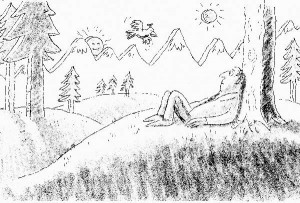Proper relaxation relieves the tensions of the body, mind and emotions, and gives one a feeling of increased vitality and energy.
A Full Relaxation Or Draining Exercise
It is helpful to have this read aloud to you:
“Close your eyes. Place your attention on your feet. Now release all tensions in your feet. Move your attention upward and release any tension being held in your legs. Now move your attention upward to your hips and buttocks, directing them in the same way to release all tension. Feel gravity take hold of your body and press it downward. Now turn your attention back to your feet to check if any tension has crept back in and relax the feet again. Do not take for granted that if you relax once, you are totally relaxed. Now bring your attention to your abdomen, releasing the tension being maintained there. Direct your attention to your lower back and release all the tension there. Bring your attention to your chest and upper back, letting the tension go. Move your attention to your neck and shoulders, releasing any tension there. Now, each time you exhale, pass your attention through the body from the feet upward, instantly releasing any tensions you notice. Continue doing this until you are satisfied with the body’s relaxation.
“Close your eyes and breathe quietly, concentrating on — but not changing — your breathing. Notice the inhalation, stop, exhalation and hold of normal breath. There is a point between the in-breath and the out-breath in which everything stops just for a moment. This is the focal point of your concentration.
“Concentrate only on your breathing, allowing all other areas of attention to fall away for a while. If a thought, effort or emotion arises, it is because you have allowed your attention to wander away from the breathing. Refix your attention on the breathing immediately, without regret or pausing to reflect on it.
“That’s all there is to it! It’s simple, but it really works! Practice this when you are under stress so you have plenty of experience with it in preparation for terminus. When in stress, the intellectual function of the mind, which is normally in control, shuts down either completely or at least partially, thus leaving the body with no “director” except the survival instinct. The body’s reaction, if untrained, will be to increase the breathing, thus increasing the adrenalin. If the body has been trained to act automatically to control the breathing and adrenalin factors even under stress, this ability will continue. That’s the point of training and applying the preparation techniques rather than just reading about them.”



